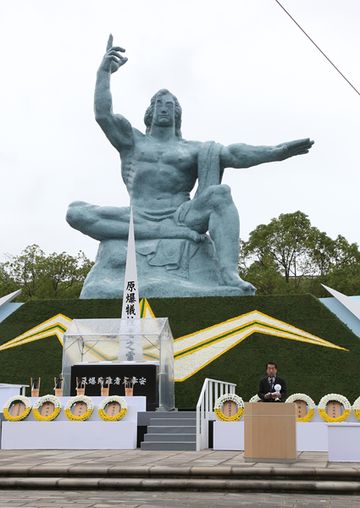
|
|
|
|
|
Address by Prime Minister Naoto Kan |
|
Here today, on the occasion of the Nagasaki Peace Ceremony, I reverently pay sincere tribute to the souls of the atomic bomb victims. Furthermore, I express my heartfelt sympathy for those suffering from the aftereffects of the atomic bombs. The horror caused by nuclear weapons should never be repeated. I firmly believe that Japan, as the only country to have experienced nuclear devastation in war, has a moral responsibility to lead actions toward realizing "a world without nuclear weapons." I will take advantage of various opportunities to appeal the importance of nuclear disarmament and non-proliferation to world leaders, including the leaders of nuclear weapon states. I am resolved to proactively propose forward-looking, concrete steps, and to contribute to consensus building in the international community. Moreover, I pledge that Japan will observe its Constitution and firmly maintain the Three Non-Nuclear Principles for the sake of the elimination of nuclear weapons and the realization of eternal world peace. Movement toward nuclear disarmament and non-proliferation has gained new momentum since President of the United States of America Barack Obama delivered his speech in Prague on nuclear weapons in April 2009. Against this backdrop, today's Peace Ceremony is being attended by the representatives of more than 30 nations. I would like to express my heartfelt welcome to all participants. I pray that the earnest desire of the people of Japan to never again see any harm caused by nuclear weapons will reach the hearts of everyone across the world. It is also my sincere wish that everyone here today will see how Nagasaki has rebuilt itself from the ashes of war to become an international tourist city and a city representing peace. More than 4,000 cities in the world have joined the Mayors of Peace, a non-governmental organization (NGO) headed by Nagasaki and Hiroshima that advocates the elimination of nuclear weapons. Movements led by NGOs like this one and civilian groups play a significant role in accelerating the movement for global nuclear disarmament. I understand that during the 2010 Review Conference of the Parties to the Treaty on the Non-Proliferation of Nuclear Weapons (NPT) held in May 2010, nearly 100 people, including atomic bomb victims, went to New York to call attention to the horror of nuclear weapons at the venue and in the streets. The efforts of these people -- the atomic bomb victims as well as the NGOs and citizens that support them -- were directly behind the achievement of the Conference, the adoption of its final document. Going forward, I would like to have atomic bomb victims represent Japan as, for example, "Special Ambassadors for Denuclearization" who will spread messages about the horror and inhumanity of the use of nuclear weapons and the value of peace to the world in various international arenas. In Nagasaki, citizens are acting as "peace guides," showing bombsites to students who visit the city on school trips. There are also activities through which young people are given the opportunity to listen to the stories of atomic bomb victims and inherit their wishes and hopes. In cooperation with the cities of Nagasaki and Hiroshima and the United Nations, the Government of Japan will begin an effort to introduce to countries around the world the personal experiences of atomic bomb victims by translating their stories into English and other languages, in an attempt to expand global educational activities for nuclear disarmament and non-proliferation. For those suffering from the consequences of the bombs, the government has been providing comprehensive support measures covering the areas of health and medical care as well as welfare. With regard to the Collective Lawsuit for the Recognition of Atomic-bomb Diseases, which continued on for many years, a confirmation note was exchanged in August 2009 to conclude the case. Based on this note, the government has withdrawn the appeal and established a fund to aid victims. Meanwhile, for those waiting to be recognized as sufferers of atomic bomb diseases, the government will do its best to grant recognition at the earliest date possible. Furthermore, we will advance deliberations on revising the system for the recognition of atomic bomb diseases through changes to the law. Moreover, the government will reinforce the support structure for those who were exposed to atomic bombs in the womb and their family members, based on their requests. Lastly, I would like to say a few words about myself. When I was studying physics at university, I learned about the Pugwash Conferences, through which Dr. Albert Einstein and the Japanese scientist Dr. Hideki Yukawa, who themselves had engaged in the development of atomic bombs, called for the abolishment of nuclear weapons. What they were faced with was a contradiction -- science, which should have contributed to the happiness of humanity, had created nuclear weapons, which threatened the survival of humanity. Learning about the activities undertaken through the Conferences, the desire grew within me to play a part in resolving this contradiction. This was one of my motives for becoming a politician. I want to always remember this original desire of mine as I redouble my utmost efforts for eliminating nuclear weapons from the world. I would like to conclude my address by offering my heartfelt prayers for the repose of the atomic bomb victims' souls and my best wishes for the future to the atomic bomb survivors and the bereaved families, and for the well-being of all participants today and the people of Nagasaki City.
9 August 2010
Naoto Kan Prime Minister of Japan
|
